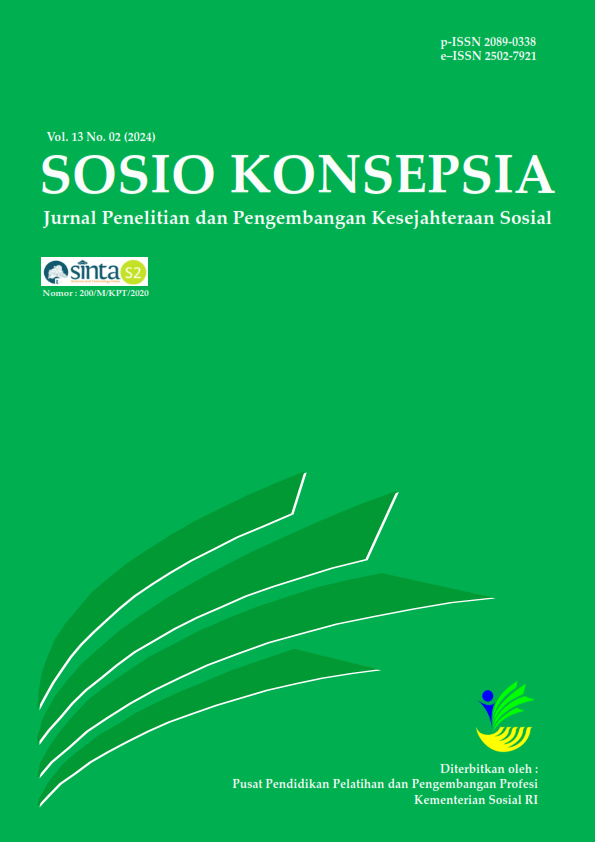Pemangku Kepentingan Mengatasi Permasalahan Anak Berhadapan Dengan Hukum Melalui Diversi
DOI:
https://doi.org/10.33007/ska.v13i2.3390Keywords:
Pemangku kepentingan, Anak Berhadapan Dengan Hukum, DiversiAbstract
Permasalahan anak yang berhadapan dengan hukum melalui diversi tidak bisa dilaksanakan oleh salah satu pihak saja, sehingga harus melibatkan berbagai pihak yang terkait. Tulisan ini bertujuan untuk menganalisa para pemangku kepentingan yang terlibat dalam diversi untuk menyelesaian; permasalahan anak yang berhadapan dengan hukum. Beberapa instansi yang terlibat dalam penyelesaian permasalahan anak yang berhadapan dengan hukum antara lain Kementerian Sisial, Kementerian Hukum dan HAM, Kepolisian, Kejaksaan dan Kehakiman. Metode yang digunakan adalah metode penelitian kualitatif deskriptif. Data primer diperoleh dari hasil wawancara dengan Pekerja Sosial dan Pembimbing Kemasyarakatan sebagai ujung tombak dalam pelaksanaan diversi. Sedang data sekunder berasal dari undang-undang, peraturan pemerintah, peraturan Menteri Hukum dan HAM. Hasil penelitian menunjukkan bahwa Sistem Peradilan Pidana Anak adalah keseluruhan proses penyelesaian perkara Anak yang berhadapan dengan hukum, mulai tahap penyelidikan sampai dengan tahap pembimbingan setelah menjalani pidana. Dalam sistem ini diversi melibatkan peranan berbagai pemangku kepentingan mulai dari Pekerja Sosial, Pembimbing Kemasyarakatan, Polisi, Jaksa, dan Hakim dalam proses penyelidikan-persidangan hingga putusan. Keberhasilan diversi dalam berbagai tingkatan ditentukan oleh bagaimana pemangku kepentingan tersebut meyakinkan keluarga dan pelaku tentang posisi anak. Inilah yang menjadi kebaruan bahwa peran pemangku kepentingan dalam memberikan kesadaran kepada keluarga pelaku dan korban dengan berbagai peran yang menjadi tanggungjawabnya.
References
Adu, J., & Oudshoorn, A. (2020). The Deinstitutionalization of Psychiatric Hospitals in Ghana: An Application of Bronfenbrenner’s Social-Ecological Model. Issues in Mental Health Nursing, 41(4), 306–314. https://doi.org/10.1080/01612840.2019.1666327
Behan, C., & Stark, A. (2023). The Gendered Nature of Imprisonment. Prisons and Imprisonment, 93–113. https://doi.org/10.1007/978-3-031-09301-2_6
Bramley, N. R., & Xu, F. (2023). Active inductive inference in children and adults: A constructivist perspective. Cognition, 238, 105471. https://doi.org/10.1016/J.COGNITION.2023.105471
Coker, D. C. (2021). The Forgotten Child: Juvenile Delinquents as a Metaphor for Change. In Handbook of Research on Barriers for Teaching 21st-Century Competencies and the Impact of Digitalization (pp. 182–196). IGI Global.
Colorafi, K. J., & Evans, B. (2016). Qualitative Descriptive Methods in Health Science Research. https://Doi.Org/10.1177/1937586715614171, 9(4), 16–25. https://doi.org/10.1177/1937586715614171
Correia, N., Camilo, C., Aguiar, C., & Amaro, F. (2019). Children’s right to participate in early childhood education settings: A systematic review. Children and Youth Services Review, 100, 76–88. https://doi.org/https://doi.org/10.1016/j.childyouth.2019.02.031
Crocker, M., & Baur, A. (2020). Connecting Loose Ends: Integrating Science into Psychoanalytic Theory. Clinical Social Work Journal. https://doi.org/10.1007/s10615-020-00774-9
Dao, L. T., & Dandurand, Y. (2021). Social, Cultural and Systemic Barriers to Child Justice Reform: Lessons from Vietnam. Https://Doi.Org/10.1177/14732254211036196, 23(1), 29–48. https://doi.org/10.1177/14732254211036196
Dunwoodie, K., Macaulay, L., & Newman, A. (2023). Qualitative interviewing in the field of work and organisational psychology: Benefits, challenges and guidelines for researchers and reviewers. Applied Psychology, 72(2), 863–889. https://doi.org/10.1111/APPS.12414
Hofmann, V., & Muller, C. M. (2018). Avoiding antisocial behavior among adolescents: The positive influence of classmates prosocial behavior. Journal of Adolescence, 68, 136–145. https://doi.org/https://doi.org/10.1016/j.adolescence.2018.07.013
Hook, M. P. Van. (2008). Social Work Practice With Families; A Resiliency Based Approach. Lyceum Books, INC.
Løvlie, A. G. (2023). Evidence in Norwegian child protection interventions – Analysing cases of familial violence. Child & Family Social Work, 28(1), 236–247. https://doi.org/10.1111/CFS.12956
Lutz, C., Berges, M., Hafemann, J., & Sticha, C. (2018). Piagets Cognitive Development in Bebras Tasks - A Descriptive Analysis by Age Groups BT - Informatics in Schools. Fundamentals of Computer Science and Software Engineering (S. N. Pozdniakov & V. Dagiene, Eds.; pp. 259–270). Springer International Publishing.
Maree, J. G. (2021). The psychosocial development theory of Erik Erikson: critical overview. Early Child Development and Care, 191(7–8), 1107–1121. https://doi.org/10.1080/03004430.2020.1845163
Midgley, J. (1995). Social Development, The Developmental Perspective In Social Welfare. SAGE Publications.
Prabowo, & Widya, K. (2019). 1.800 Anak Pelaku Terorisme Tidak Terjamah Pemerintah. Medcom.Id. https://www.medcom.id/nasional/hukum/lKY6ZoWN-1-800-anak-pelaku-terorisme-tidak-terjamah-pemerintah
Santrock, J. W. (2010). Child Development (13th ed.). McGraw-Hill.
Setiawan, H. H., Wardianti, A., & Irmayani, N. R. (2023). The Practice of Diversion for Perpetrators of Child Crimes in Indonesia. Restorative Justice and Practices in the 21st Century, 205–224. https://doi.org/10.4018/978-1-6684-6145-7.CH009:
Squires, V. (2023). Thematic Analysis. 463–468. https://doi.org/10.1007/978-3-031-04394-9_72
Taber, K. S. (2020). Mediated Learning Leading Development—The Social Development Theory of Lev Vygotsky BT - Science Education in Theory and Practice: An Introductory Guide to Learning Theory (B. Akpan & T. J. Kennedy, Eds.; pp. 277–291). Springer International Publishing. https://doi.org/10.1007/978-3-030-43620-9_19
Ward, T., & Birgden, A. (2007). Human Rights and Correctional Cinical Prctice. Aggression and Violent Behavior, 12, 628–643.
Wilson, H. A., & Hoge, R. D. (2012). The Effect of Youth Diversion Programs on Recidivism. Http://Dx.Doi.Org/10.1177/0093854812451089, 40(5), 497–518. https://doi.org/10.1177/0093854812451089
Downloads
Published
How to Cite
Issue
Section
License
Copyright (c) 2024 Adhani Wardianti, Achmad Hufad, Uyu Wahyudin , Ace Suryadi, Rinikso Kartono (Author)

This work is licensed under a Creative Commons Attribution-NonCommercial-ShareAlike 4.0 International License.
Most read articles by the same author(s)
- Rosi Rosilawati, Uyu Wahyudin, Mustofa Kamil, Oong Komar, Yanti Shantini, Transformasi Ekonomi Keluarga Penerima Manfaat Program Keluarga Harapan: Kewirausahaan dalam Pembuatan Cilok dan Kripik di Kelurahan Dago Kota Bandung , Sosio Konsepsia: Jurnal Penelitian dan Pengembangan Kesejahteraan Sosial: Vol. 15 No. 1 (2025): Sosio Konsepsia: Jurnal Penelitian dan Pengembangan Kesejahteraan Sosial
- Irniyati Samosir, Achmad Hufad, Jajat Sudrajat, Uyu Wahyudin, Sardin, Mustofa Kamil, Strategi Media Sosial (start-up) Silang.ig dalam Menciptakan Akses Daring Ramah Disabilitas Bagi Teman Tuli , Sosio Konsepsia: Jurnal Penelitian dan Pengembangan Kesejahteraan Sosial: Vol. 14 No. 3 (2025): Sosio Konsepsia: Jurnal Penelitian dan Pengembangan Kesejahteraan Sosial






